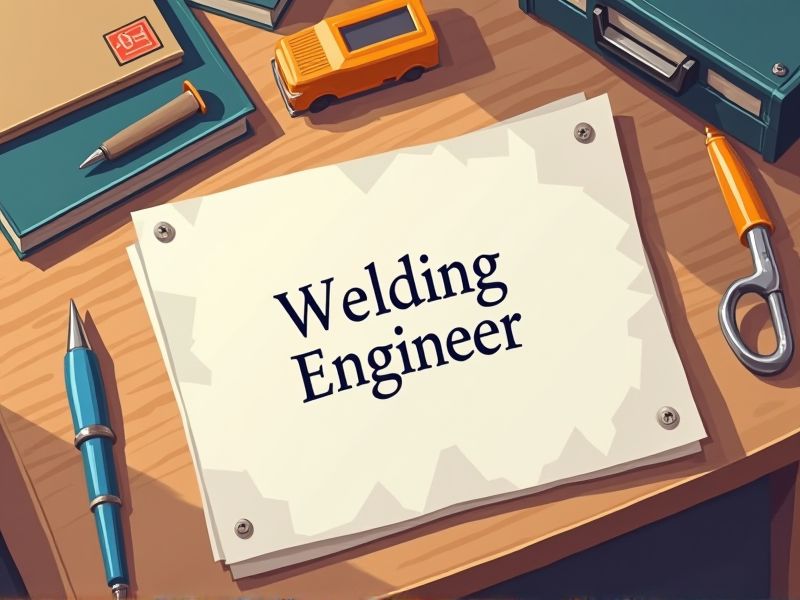
Welding Engineers play a crucial role in ensuring the structural integrity of metal constructions, directly impacting public safety and industrial efficiency. Due to evolving technology and stringent industry regulations, obtaining specific certifications validates their expertise and keeps them updated on the latest techniques and safety standards. These certifications not only enhance their technical skills but also increase employability in a competitive market. Key certifications important for Welding Engineers include the following.
AWS Certified Welding Engineer (CWEng)
The AWS Certified Welding Engineer (CWEng) credential signifies a comprehensive understanding of welding processes, materials, and quality control, essential for ensuring project safety and efficiency. Having this certification often leads to increased job opportunities and higher salary potential due to the specialized skill set it represents. Companies benefit from employing AWS Certified Welding Engineers by reducing the risk of welding-related failures and ensuring compliance with industry regulations. The credential facilitates professional growth by providing structured learning, which enhances technical knowledge and practical problem-solving capabilities.
AWS Certified Welding Inspector (CWI)
The AWS Certified Welding Inspector (CWI) certification provides a standardized validation of a welding engineer's expertise and knowledge, ensuring compliance with industry standards and codes. It enhances credibility and assurance in quality control, leading to improved trust from clients and employers. The certification often serves as a requirement in many projects, influencing hiring decisions and project eligibility. Possessing CWI qualification potentially increases job opportunities and career advancement prospects in the competitive field of welding engineering.
AWS Certified Associate Welding Inspector (CAWI)
An AWS Certified Associate Welding Inspector (CAWI) is critical for a Welding Engineer to ensure adherence to industry standards and regulations. Knowledge gained from CAWI certification assists in identifying potential defects and maintaining quality control in welding processes. This certification enhances a welding engineer's capacity to collaborate effectively with teams on inspecting and resolving welding-related issues. CAWI credential demonstrates a commitment to safety and quality, reinforcing the engineer's professional credibility.
AWS D1.1 Structural Welding Certification
Welding engineers require AWS D1.1 Structural Welding Certification because it ensures their understanding of industry-standard welding practices, enhancing the safety and integrity of structures. This certification validates their knowledge and skills in applying specific codes crucial for structural steel welding. Employers prioritize certified engineers because it reduces risks associated with welding mistakes and structural failures. Certified professionals tend to have better career opportunities and potential for higher earnings due to recognized proficiency.
ASME Section IX Welding Certification
The ASME Section IX Welding Certification is needed for a Welding Engineer because it ensures that their skills and procedures meet industry-wide recognized standards. This certification provides a benchmark for quality assurance, reducing the likelihood of defects and failures in welded components. Employers see this certification as a testament to a Welding Engineer's capability and expertise, enhancing job prospects and career growth. Compliance with ASME standards is often a regulatory requirement in industries like oil, gas, and nuclear, making the certification essential for legal and safety standards.
API 1104 Welding Certification
API 1104 Welding Certification is essential for a welding engineer because it ensures competency in the welding procedures specific to the oil and gas pipeline industry. The certification helps align with industry standards, enhancing safety and efficiency in pipeline construction and maintenance. Employers often require this certification to verify a welding engineer's expertise in critical welding operations. Achieving API 1104 certification can lead to increased job opportunities and career advancement within the energy sector.
Certified Welding Educator (CWE)
Certified Welding Educators (CWE) ensure welding engineers receive consistent training, enhancing their skill sets in line with industry standards. When welding engineers work with a CWE, it results in a deeper understanding of welding processes, leading to minimized errors and increased workplace safety. The presence of a CWE often leads to improved documentation and adherence to protocols, benefiting project timelines and outcomes. Welding engineers who engage with CWE programs typically see advancements in career prospects and professional credibility.
NDT Level II Certification
NDT Level II Certification equips a welding engineer with the skills to accurately detect and evaluate welding defects, ensuring the integrity of welds. This capability reduces the risk of structural failures, enhancing safety and reliability in critical industries. Certified engineers gain a competitive edge in the job market, often commanding higher salaries. Industry standards often require certified professionals to maintain compliance and quality assurance in welding projects.
ISO 9001 Quality Management Certification
Obtaining ISO 9001 Quality Management Certification ensures a welding engineer adheres to recognized international quality standards, which enhances credibility and trust with clients and stakeholders. This certification drives consistent monitoring and improvement of welding processes, leading to higher efficiency and reduced defects. Compliance with ISO 9001 can improve product safety and reliability, minimizing risks and potential liabilities. Clients may require their welding partners to be ISO 9001 certified, making it a competitive advantage in the industry.
AWS Certified Robotic Arc Welding Certification
The AWS Certified Robotic Arc Welding Certification ensures that welding engineers possess the industry-standard skills necessary to safely and effectively operate robotic welding systems, which are increasingly used in manufacturing. It validates an engineer's ability to program, troubleshoot, and maintain these systems, leading to increased productivity and reduced error rates. Companies seeking to implement automation rely on certified professionals to adapt to technological advancements and improve workflow efficiency. Having this certification can enhance career prospects for welding engineers by demonstrating expertise and commitment to maintaining up-to-date technical knowledge.
Summary
By obtaining certifications, you enhance your credibility as a welding engineer in the industry. This may lead to increased job opportunities and potential for higher salaries. Certifications validate your expertise, making you more appealing to employers seeking verified skills. You become a valuable asset in ensuring quality and compliance in welding projects.
